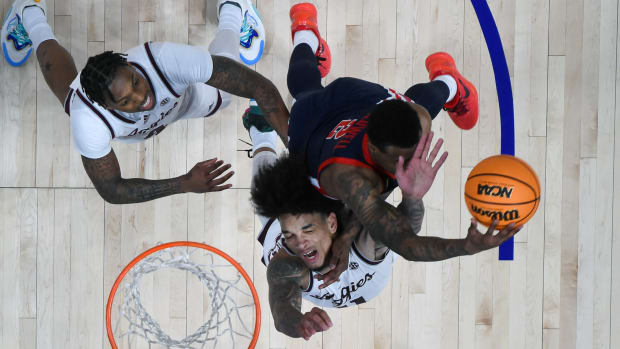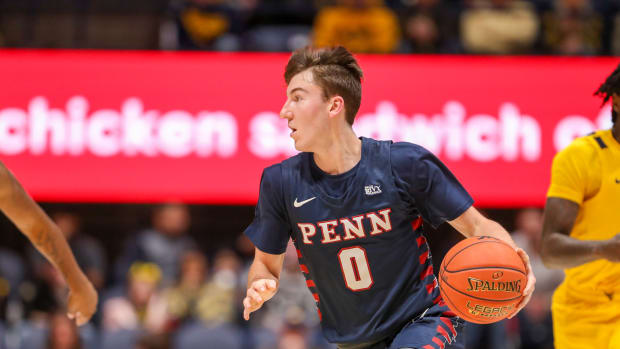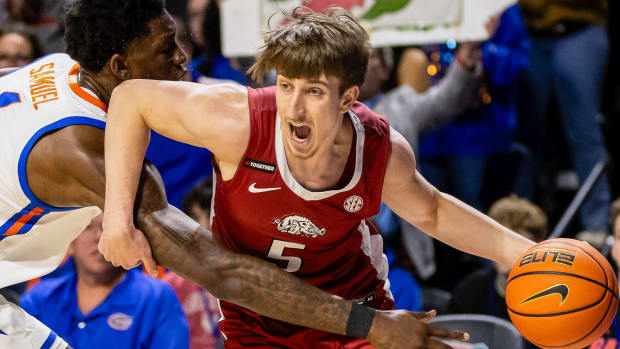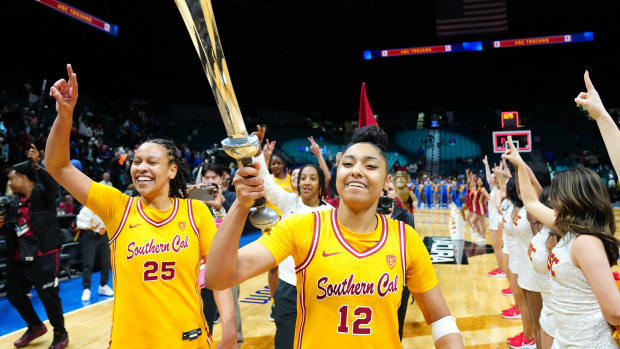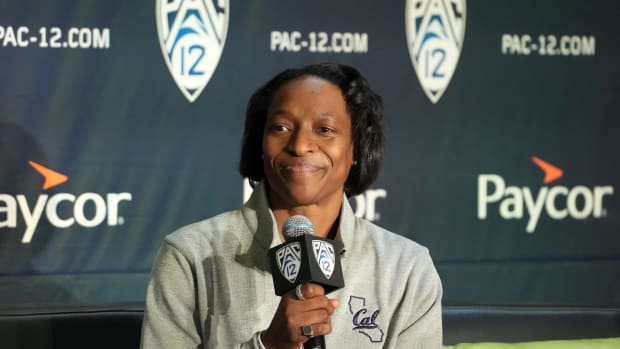The coach who is trying to win a national title and launch the next men’s college basketball powerhouse has a message for his peers:
“The players dictate everything. The coach has no power anymore.” Penny Hardaway says this without hesitation or bitterness, which explains, as much as anything, why his Memphis program is ascendant. To many coaches, college basketball has been flipped upside down. Hardaway thinks it is now right side up.
Hardaway has never coached an NCAA tournament game, yet he is leading college basketball’s team of the moment. This is how fast the sport has moved lately: Eighteen months ago, his two best players, projected future NBA lottery picks Emoni Bates and Jalen Duren, were high school sophomores in Ypsilanti, Mich., and Philadelphia, respectively.
Bates was the most hyped prospect of his generation, yet he says the two recruiting titans of this age, Duke and Kentucky, never offered him a scholarship, figuring he would follow other recent stars to the NBA G League or some other pro outfit before entering the NBA. Then the Supreme Court ruled that college players could cash in on name, image and likeness. After transferring to private high schools, Duren and Bates each graduated a year early and immediately became top-five prospects in their new class. Now they live next door to each other in a dorm, like typical college students, but they’re each free to make hundreds of thousands of dollars this year through their fame.
Talk to Bates and Duren now, and you wonder: Did Hardaway score the recruiting coup of the year when they signed—or did they?
Bates and Duren so dictated the terms of engagement that it was like the players offered the coach a chance to sign with them. They were not really high school students picking a college. They were not even high school stars picking a college program. They were future NBA millionaires who decided to play together, then defined the environment they wanted and chose the place that would provide it. History, conference affiliation, national profile, recent success—these factors did not drive their decisions. Hardaway says their recruiting was like modern NBA free agency, where players choose the roster, coach and system that can advance their careers.
VAULT: It Had to Be Penny—Why Hardaway Returned to Memphis
Duren confirms: “That’s exactly as we viewed it.”
He says their reasons for choosing Memphis are “all right in front of you.” Hardaway, a former NBA All-Star point guard, can tutor Bates on how to play the position. One of Hardaway’s assistants, Larry Brown, is one of the best teaching coaches in history. Another, former All-Star Rasheed Wallace, can teach Duren about playing power forward. Bates and Duren join a team that won the NIT and returns three of its top- five scorers—a seemingly ideal supporting cast.
From Adolph Rupp to John Wooden to Dean Smith to John Thompson to Mike Krzyzewski, men’s college basketball was built by coaches with an aura—men who had complete control of their programs and were idolized for it. If Hardaway succeeds them, it will be partly because he recognizes the job description has changed.
“You’re the guy, but you got to give a lot,” he says. “You can’t go in there pounding your fist. You’ll never make it.”
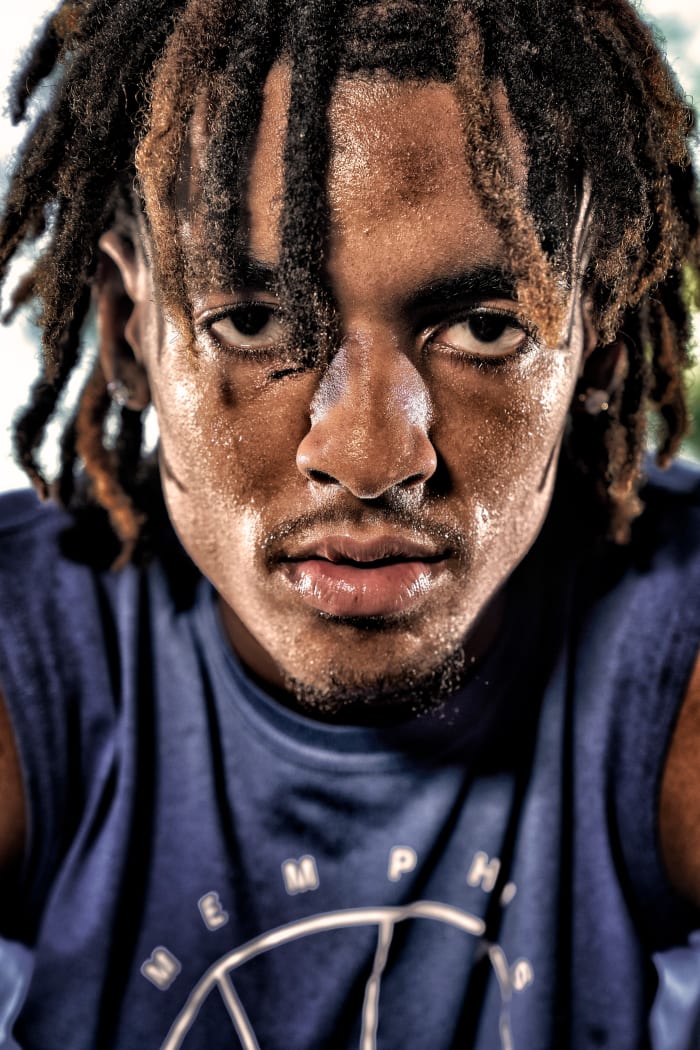
Bates often felt unchallenged by his high school and AAU competition—with Memphis's season set to start Tuesday, he'll get to test himself at the next level.
Taylor Ballantyne/Sports Illustrated
It happened, like so many life-changing moments, in a Waffle House.
Bates and Duren had taken different paths to the same emotional place. Bates was a rare basketball prodigy. Hardaway, a two-time first-team All-NBA player who once defeated Michael Jordan’s Bulls in a playoff series, says, “The first time I saw Emoni was probably sixth grade. I was like, Wow, this kid is gonna be special. He really reminded me of Kevin Durant.” In sixth grade, the only part of Duren’s game that reminded anybody of Durant was his name. James Johns, his AAU coach with the Philadelphia-based Team Final, jokes that when Duren was 11 “he couldn’t walk and chew gum at the same time.”5
Duren’s coordination eventually caught up with his body, and he developed into a 6' 11" Marvel character—a strong, athletic freak with a soft touch whom Hardaway says is “almost like a reincarnation of Chris Webber.” By earlier this year, as they considered their playing options, he and Bates were on the cusp of achieving their dreams, but before they could get there, they were already worn out.
Bates was on the cover of Sports Illustrated at the beginning of his sophomore year at Ypsilanti Lincoln High, and he was touted across the media landscape as basketball’s next generational talent. He had everything you could want in the game, except peers—and maybe some more bulk. Overmatched high school opponents tried to abuse his thin frame. Largely because he sought better competition, he left Lincoln after his sophomore year for a pop-up school, Ypsi Prep, that his father, E.J., founded. But on both that team and with Bates Fundamentals, the AAU squad his dad also ran, Emoni had to carry teammates who could not match his talent or drive. He started forcing shots and got visibly frustrated on the court. For the first time in Bates’s life, people started questioning how good he was and whether he put his team first. Some analysts wondered whether he was really the best player in his class.
Of his doubters, Bates, now 17, says, “That’s people that don’t know the game.” Still, he needed a change, and so he joined Duren on Team Final and went to South Carolina for the recruiting circuit’s marquee event, the Nike EYBL Peach Jam. Johns could see that the pressure of living up to their billing was getting to both of them. On a day off he arranged for breakfast with them at a Waffle House. The trio was joined by Bates’s father and another team assistant coach. As they talked, the players found comfort in knowing they faced similar emotional challenges. Then they walked out and found basketball brotherhood.
Bates was already over trying to score 50 every game. At 6' 9", he wanted to be a point guard. Johns tested Bates by bringing him off the bench in his first game with Team Final, to see whether he would complain. He didn’t. Then Bates went into the game, and Johns had to pull him aside: You’re being too unselfish.
“People have the worst perception,” says Johns, now an assistant at Division I Fairfield, in Connecticut. “He is the most unbelievable, unselfish kid. I was shocked.”
Like Bates, Duren had outgrown his competition, but in different ways: He was so big and strong that nobody knew how to officiate him.
“I don’t want to sound crazy when I say this, but they kind of pushed him out of high school,” Johns says. “There are times he is penalized for playing hard. Now he has to take his foot off the gas, and he is frustrated.”
With Bates’s sharing the attention and feeding him in transition, Duren seemed transformed. They won the title at Peach Jam. Bates, who had verbally committed to Michigan State in June 2020, started seriously talking to Duren about playing college ball together. They just needed to find a coach willing to replicate what they had already built and then improve on it.
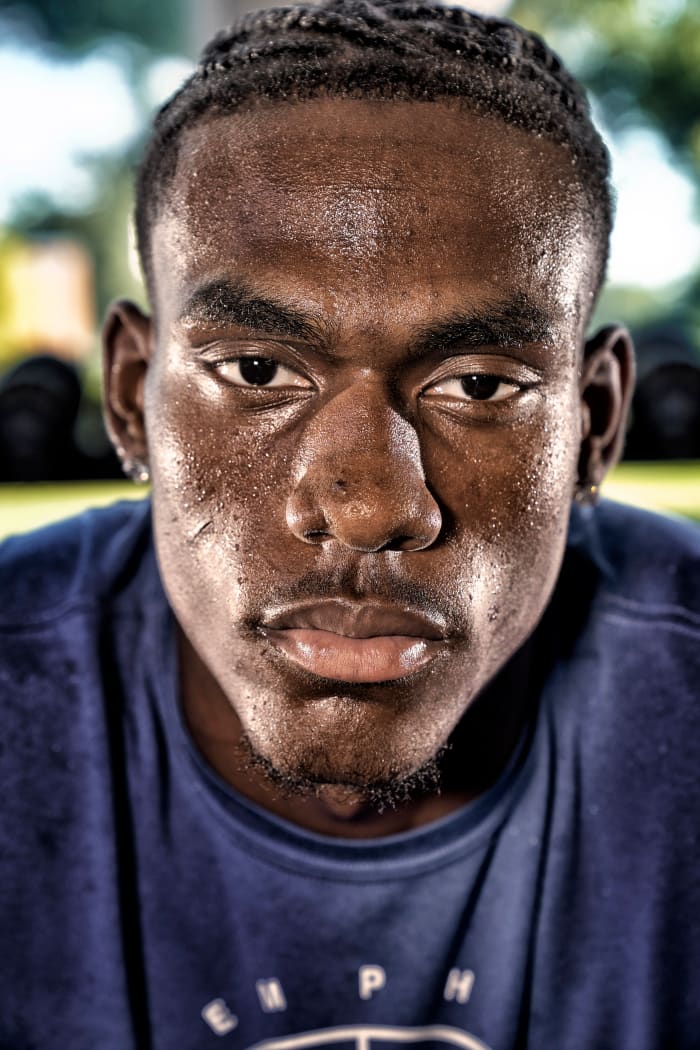
Hardaway has described the 6'10" Duren as “almost like a reincarnation of Chris Webber."
Taylor Ballantyne/Sports Illustrated
Six years before Jalen Duren and Emoni Bates were born, Penny Hardaway got his coach fired. The player insurrection that forced the Magic to ax Brian Hill damaged Hardaway’s reputation, but it also presaged the current era of player empowerment. Hardaway believed that coaches should see their players as partners, instead of employees. He still does.
He says even now, when he sees an NBA player battling with his franchise, “I always view everything as a player first, coach second. I’ve been in those situations.” This means that when he talks to a player, he doesn’t have to stop and remind himself: There are feelings at stake. He understands, instinctively, that the line between player and coach isn’t as thick as it used to be. His players call him Coach P or Coach Penny, not Coach Hardaway. (One, guard Jayden Hardaway, still calls him “Dad,” even during practice.)
“Back in the day, your coach was everything, especially in high school and in college—like your father figure,” Hardaway says. “Now it’s almost like business partners. It used to be, I gave you your scholarship. You listen to what I say, and you’ll be quiet. In today’s world, it doesn’t work that way.”
Hardaway, 50, remembers being paddled by coaches growing up: “That was a universal thing around Memphis. Like, if you had bad grades, if you were doing things in school that were not satisfactory to the coach, the parents gave the O.K.: You can discipline him.” Now he wonders how much a coach can even yell at his players.
Hardaway did not work his way up through the college ranks as an assistant. He led middle school, high school and AAU teams instead. It gave him an understanding of the current teenage star’s mindset.
Today he runs a developmental basketball program, not a fiefdom. Hardaway says that when Bates first reached out and asked him to teach him how to play point guard, earlier this year, “I was like: ‘O.K., if you go professional, then come down in the summers.’ ” Young pros often come to the Memphis campus in the summer to work out, even if they never attended the school. Then Bates clarified: He wanted Memphis to recruit him, to play with Duren, whom Hardaway had already been courting.
Bates and Duren are like Kevin Durant and Kyrie Irving when they decided to go to Brooklyn together. Or LeBron James’s taking his own program to a new city. “That’s what he did in Miami,” Hardaway says. “That’s what he did in L.A.”
And you’re comfortable with these guys doing that in Memphis?
“Yeah, because I know we can help them. It’s a mutual deal. We see your talent. We understand that you’re great. And we can help mold that greatness.”
Many of the old reasons that elite players chose schools no longer apply. They don’t need more exposure—Bates has more than 400,000 Instagram followers already. They don’t need to prove themselves against the best competition—they have already faced future NBA lottery picks many times in AAU and with USA Basketball, and NBA scouts have seen them do it.
For decades, the best recruiting coaches had to figure out who would sway the decision. The mother? The father? The grandmother? The AAU coach? Sweet-talk that person (or pay them under the table), and the star would come. But Bates and Duren are connected to people who already know the landscape. Bates rattles off a partial list of NBA players he considers friends: “LeBron, Ja [Morant], Dejounte Murray, KD, Miles Bridges—people I just got bonds with. Carmelo Anthony is a big brother.” When Duren was pondering his next step, he consulted a Philadelphia connection, Clippers forward Marcus Morris Sr.
“He spoke highly of Penny,” Duren says. “Like: ‘It’s genuine—he has a lot of love for his players.’ When I took a visit, I had that in mind.”
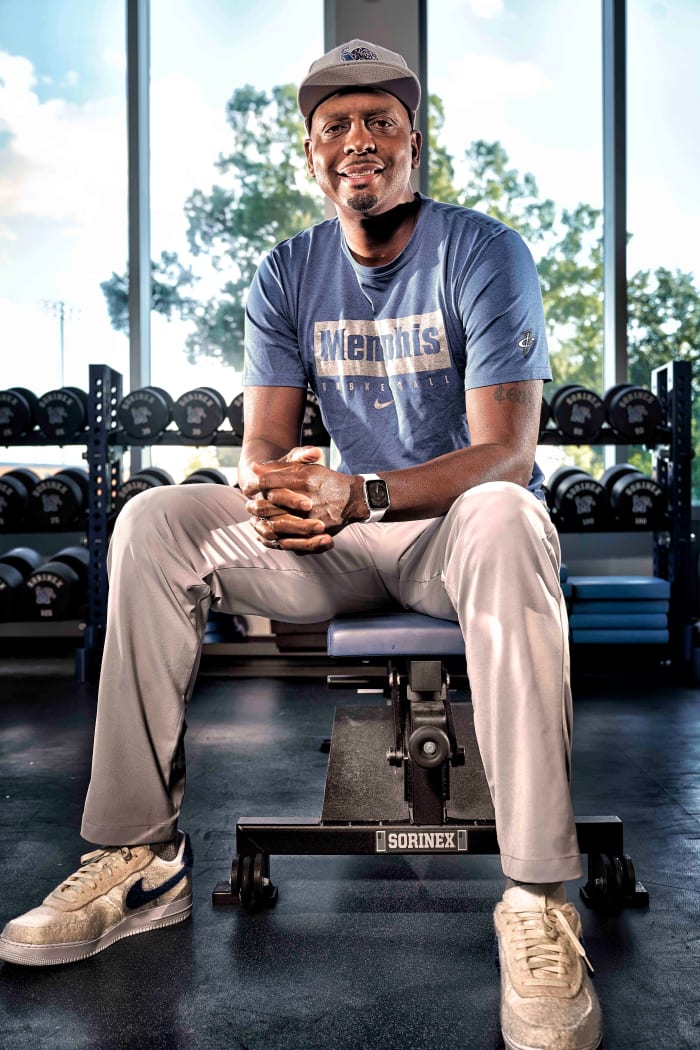
At 50, Hardaway says players are finally achieving the power they should have had back when he was playing.
Taylor Ballantyne/Sports Illustrated
There have been rumors that FedEx, which is based in Memphis, has been helping Hardaway lure talent with name, image and likeness opportunities, but in the new world of NIL, that speculation may be missing the point. Bates and Duren are so good, so well known, that they should make well into six figures immediately, whether they play in Memphis, Lexington or East Lansing—and soon they will make millions.
Duren will be a lottery pick next summer. Bates would be, too, but his birthday is his albatross: He was born Jan. 28, 2004, and, since NBA rules require players to be 18 at the start of a given draft’s calendar year, he’s not eligible until ’23.
To say that Bates is hoping for a rule change or a waiver is an understatement. “That’s my plan,” he says, “and I’m sticking with it.” Whatever happens, this much is clear: He was thinking about an exit strategy before he even got to Memphis. The challenge, then, is making his time there worthwhile for everybody.
Hardaway has more at stake this season than his two stars. They could walk away any day, like former Tiger James Wiseman did two years ago, after the NCAA suspended him. (Wiseman was still the No. 2 pick in the draft, by the Warriors.) Hardaway probably needs this season to go well to secure the next wave of talent. To make this all work, he has to do more than just prep Bates and Duren for the pros. He must make them feel the same way he felt 30 years ago, when he played for what was then Memphis State.
“It was the best time of my life,” Hardaway says. “I’ve had a ton of money, [was] blessed from God to make it to the NBA, but that’s more business [than college]. It’s not as fun.”
He wants Bates and Duren to enjoy the moment instead of feeling squeezed between childhood and professional basketball. Theirs can be a confusing life stage. Bates says he likes Hardaway because “just talking to him, he knows how to treat kids.” In another beat he says he’s ready for the league of James and Durant. “Skill set, I feel like I’m there. Mentally, I feel like I’m there. It’s just getting my body right.” (Bates’s father says of his son: “He’s 17. He still has a ways to go. A lot of people perceive him as an adult, but he’s not.”)
Watch NCAA basketball games online all season long with fuboTV: Start with a 7-day free trial!
Bates and Duren are each half-kid, half-superstar, and Hardaway has to treat them that way. He was a playing prodigy himself, but he says today’s best players “come in more skilled and being able to do more things than we did, because all we did was play basketball all day. We never had a trainer.” Yet he also recognizes that Bates and Duren require a softer touch than his coaches had with him.
“If I tell them, ‘Hey, man, you let me down,’ it’ll hurt them,” he says. “I want us to have a relationship that, if they feel like they let me down, they will feel bad and be like, ‘All right, I’m not doing it again.’ ”
The Tigers are sixth in SI's preseason ranking and 12th in the AP top 25. Hardaway says his main concern is chemistry. “[I’m] not worried about the X’s and O’s. Not worried about teaching and development. It’s more about egos. You got so many good players, and everybody wants the same thing.”
Duren and Bates are in Memphis because they wanted the same things. Not pedigree. Not individual achievement. Not even a national championship, though that’s obviously a goal. They sought a sanctuary, a classroom and a feeling that the modern prep-basketball industry often fails to provide.
“I’m happy,” Bates says. “I ain’t been happy in a minute.”
More College Basketball Coverage:
• SI's Preseason Ranking of All 358 Men's Teams
• 64 Reasons to Be Excited for the CBB Season
• Men's National Player of Year Candidates
Sports Illustrated may receive compensation for some links to products and services on this website.



